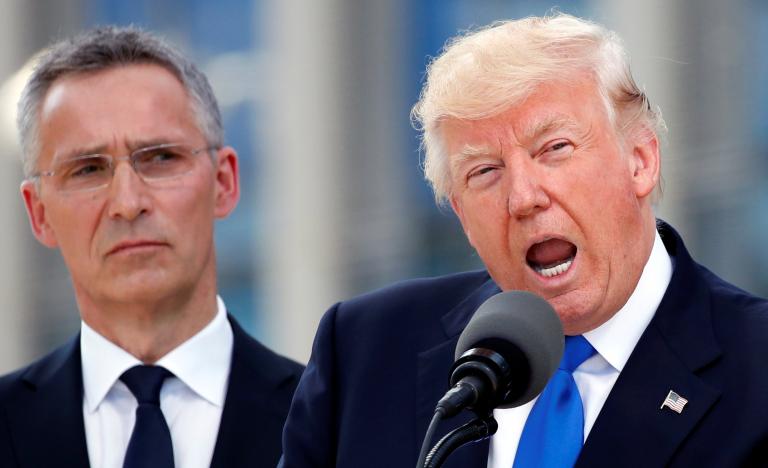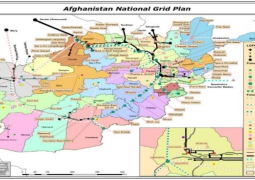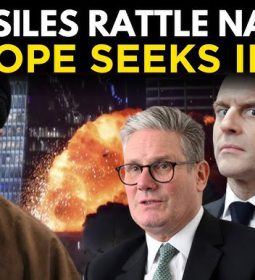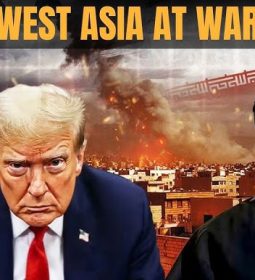After Tense G-7 Meeting, Angela Merkel Looks Past Trump

BERLIN — Chancellor Angela Merkel of Germany, Europe’s most influential leader, has concluded, after three days of trans-Atlantic meetings, that the United States of President Trump is not the reliable partner her country and the Continent have automatically depended on in the past.
Clearly disappointed with Mr. Trump’s reluctance to publicly endorse NATO’s doctrine of collective defense — or to agree to common European positions on Russia, climate change or global trade — Ms. Merkel said in Munich on Sunday that traditional alliances were no longer as steadfast as they once were, and that Europe should pay more attention to its own interests “and really take our fate into our own hands.”
Her strong comments were a further indication that Mr. Trump’s trip did not go down well with major European leaders and seems to have increased trans-Atlantic strains rather than diminished them.
“This seems to be the end of an era, one in which the United States led and Europe followed,” said Ivo H. Daalder, a former United States ambassador to NATO who is now the director of the Chicago Council on Global Affairs. “Today, the United States is heading into a direction on key issues that seems diametrically opposite of where Europe is heading. Merkel’s comments are an acknowledgment of that new reality.”
Ms. Merkel, who did not mention Mr. Trump by name, also spoke of Britain’s decision to leave the European Union, which means the bloc will lose its second-largest economy and one of its two nuclear powers. Britain’s departure, or “Brexit,” will also weaken trans-Atlantic ties and leave the Continent more exposed than before.
“The times in which we could rely fully on others — they are somewhat over,” Ms. Merkel said, speaking on the campaign trail after a contentious NATO summit meeting in Brussels and a Group of 7 meeting in Italy. “This is what I experienced in the last few days.”
Given this new context for international relations, she said, “that is why I can only say that we Europeans must really take our fate into our own hands — of course in friendship with the United States of America, in friendship with Great Britain and as good neighbors wherever that is possible also with other countries, even with Russia.”
But Europe must stand up for its own interests and become more self-reliant, she said, including on defense, an issue she has raised often since the British vote to withdraw from the bloc. “We have to know that we must fight for our future on our own, for our destiny as Europeans,” Ms. Merkel said.
With her statement, she seemed to be calling for German voters to get accustomed to a more active European role — and to more involvement by Berlin in crises on the Continent as well as global ones affecting Europe’s future. German parliamentary elections, in which Ms. Merkel is seeking a fourth term as chancellor, will be held in September.
Ms. Merkel was known to have been unsettled by her meetings with Mr. Trump in Washington in March, and she had been concerned that if Marine Le Pen won the French presidency this month, Germany would be isolated and the European Union badly damaged.
The victory of the pro-European Union Emmanuel Macron in France’s election, and his clear willingness to partner with Germany and to help lead the bloc out of its troubles, suggest that Ms. Merkel sees Germany’s future more and more with the European Union of 27 nations, minus Britain, with less reliance on the United States.
But Mr. Macron, who was meeting Mr. Trump for the first time, appeared to have a less negative impression of the outcome of the three days of talks than Ms. Merkel. In a news conference at the end of the Group of 7 conference, Mr. Macron took a glass-half-full approach, saying that he believed, over all, that despite Mr. Trump’s earlier hostile language toward NATO, multilateralism was intact and there was a shared vision in a number of areas.
Mr. Trump campaigned on a platform of trade protectionism, nationalism and skepticism about multilateralism and climate change — all issues on which most European leaders have widely differing views. Europeans also depend on NATO for their ultimate defense and are more concerned about a more aggressive Russia than Mr. Trump seems to be, although his secretary of defense and national security adviser, both senior military officers, insist that the president is fully behind NATO’s Article 5, which requires all members to come to the defense of any NATO country that is attacked.
DOCUMENT
Mr. Daalder said: “This is ‘America First’ — a policy focused on narrow self-interest — and abandons the idea that the best way to enhance our security and prosperity is by having strong allies and leading globally in pursuit of common values and interests.”
Ms. Merkel seemed particularly upset with Mr. Trump’s refusal to endorse language supporting free trade and backing the Paris climate accord in the Group of 7 declaration after two days of talks in Taormina, Sicily. There have been reports that Mr. Trump intends to abandon the 195-nation climate deal agreed upon in 2015, arguing that it hurts the American economy.
The climate accord was the most vivid sign of division between the United States and its allies, but Mr. Trump, who returned home after a nine-day trip overseas, also scolded Germany for its trade practices and lectured NATO members for what he said was their inadequate support of the alliance. In Brussels, Mr. Trump repeated comments that Germany was “very bad” because of its trade surplus and the fact that some German car companies manufacture in Mexico for importing into the United States, even though many of them produce cars in American factories with American workers.
On Saturday, Ms. Merkel was unusually direct in discussing what she called unsatisfying talks on climate change, which is an important issue for many German voters and a hallmark issue for the chancellor, who first made her mark in the 1990s shepherding an international accord on the environment.
Ms. Merkel’s disappointment on climate was not entirely shared by Mr. Macron, who said that Mr. Trump had at least listened to the arguments of the other G-7 leaders.
Ms. Merkel, however, sounded a somewhat bleaker note. “The whole discussion about climate was very difficult, not to say unsatisfactory,” she said. “There’s a situation where it’s six, if you count the European Union, seven, against one.”
“This is not just any old agreement, but it is a central agreement for shaping globalization,” she said. “There are no signs of whether the U.S. will stay in the Paris accords or not.”
Mr. Macron, 39, told the French news media that his now-famous handshake tussle with Mr. Trump was a deliberate effort to show that he could not be pushed around by the American president. He told the Sunday newspaper Journal du Dimanche that it was “a moment of truth” — designed to show that he is no pushover, and a message for the European Union leadership, as well.
“My handshake with him — it wasn’t innocent,” Mr. Macron said. “One must show that you won’t make small concessions, even symbolic ones, but also not over-publicize things, either.”
The budding Merkel-Macron relationship is important, and Ms. Merkel has moved quickly to embrace him, conscious that he must still try to win a legislative majority in elections next month to be an effective partner. The European Union has traditionally been at its strongest when its two biggest continental powers work closely in tandem.
Accordingly, Ms. Merkel and her top aides held a bilateral meeting on Friday night in Sicily with Mr. Macron and his top officials, German officials said. Most strikingly, the spouses of the German and French leaders also attended. It is rare for Ms. Merkel’s husband, Joachim Sauer, to accompany her on trips abroad — something she recently said that he decides. Brigitte Macron is new to the role of France’s first lady, but Mr. Macron has credited her with giving him valuable political advice.
In general, Mr. Macron — who will meet with President Vladimir V. Putin of Russia on Monday at the Versailles palace outside Paris — has stressed friendship with Germany, appointing German speakers to critical positions, including prime minister, chief foreign policy adviser and a rejiggered defense brief. The newly elected president also kept the tradition of paying his first official visit to Berlin, doing so on his first full day in office.
As for Mr. Trump, he has pronounced the trip as a resounding success. On Sunday, after being restrained while abroad, he returned to form, unleashing a barrage of Twitter posts. Among them: “Just returned from Europe. Trip was a great success for America. Hard work but big results!”
Mr. Daalder disagreed. “The president’s failure to endorse Article 5 in a speech at NATO headquarters, his continued lambasting of Germany and other allies on trade, his apparent decision to walk away from the Paris climate agreement — all suggest that the United States is less interested in leading globally than has been the case for the last 70 years,” he said.
- Previous Noth Korea test-fires another missile
- Next Pakistan fears Indian influence in Afghanistan, say US spy chiefs
















